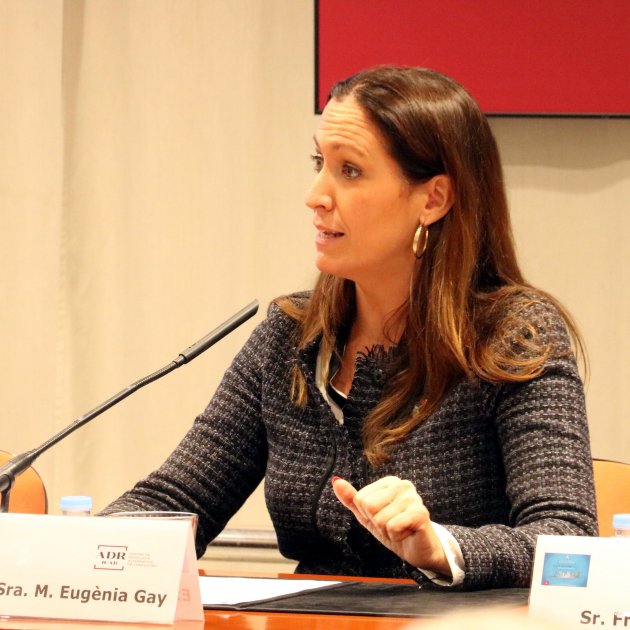The president of the Barcelona Bar Association (ICAB), Maria Eugènia Gay, will replace Teresa Cunillera in the Spanish government delegation in Catalonia, as newspaper La Vanguardia advanced and sources of the central government confirmed to ElNacional.cat. Cunillera announced her resignation on Friday 14th, after sending a letter to the Spanish prime minister, Pedro Sánchez, in which she expressed her will to step down now that she considers that the situation in Catalonia "has improved considerably since she assumed the position".
Sánchez’s government will appoint Mª Eugènia Gay to the Spanish cabinet next Tuesday. Until then, according to sources of the Association, they cannot announce her replacement. The institution’s statute establishes that the replacement at the head of the ICAB must be the vice president, who is the lawyer Jesús Maria Sánchez. Curiously, the ICAB headquarters are in front of the delegation’s headquarters, in Pau Claris Street. "It is an institutional position and she believes she can do a very good job and, moreover, from Catalonia," said sources close to Gay.
Gay was re-elected as president on June 4th, 2021, after serving her first term, which began in 2017. In the presentation of her candidacy for re-election, she assured that should she win again she would continue fighting for the defence of the rights and freedoms of the citizenship, even if it generated "discomfort" to the public authorities. During her tenure as leader of the Catalan Bar, she acted as a bridge with the Spanish government, and her name was even mentioned as a possible minister of Justice.
Cunillera, historical leader
Gay's appointment comes after Cunillera’s tenure, who took office in June 2018, substituting Enric Millo. Cunillera is a historic PSC leader, with an extensive political career as a socialist: in 1982 she entered as a deputy in Congress, but four years later she left the seat to become director general of the Spanish Cabinet. She re-entered Congress in 1966, where she remained until 2015 and as first vice-president.
The last appearance Cunillera made as delegate of the Spanish government was on Wednesday, January 12th, to present the balance on the Spanish State’s fulfilment rate of the commitments made with Catalonia. In a press conference she explained that, out of the 1,481 commitments undertaken, 42.7% have been fulfilled, and it is expected that in the first half of 2022 that number will grow to 48.3%. Of all the commitments, 428 are from the agreement between PSOE and their partners in government, Unidas Podemos, and 44.4% have been fulfilled. On the other hand, by December 31st, 27.5% of the commitments associated with the recovery, transformation, and resilience plan had been fulfilled.
In that same appearance, and just a day after the controversy erupted due to the statements of former Spanish police commissioner José Manuel Villarejo, the delegate of the Spanish government assured that the accusations linking the Spanish National Intelligence Centre (CNI) with the August 2017 attacks in Barcelona and Cambrils had "no credibility". She did not clarify whether they will investigate the accusations to get to the bottom of the matter, as requested by the main Catalan authorities.
Gay, an impactful feminist
Maria Eugènia Gay follows in the footsteps of her father, Eugeni Gay, whom she admires and, finally, will also have a position in the Spanish government. Eugeni Gay was vice president and member of Spain’s Constitutional Court (TC) between 2001 and 2012. In her first term as president of the Barcelona Bar Association, Gay showed her great work ethic when reactivating the institution and establishing bridges again to influence new state laws, which provided more guarantees for citizens, but also for businessmen.
Gay also tried to lead a mediation group, with union representatives and other bodies, to stop the conflict between Catalonia and the Spanish state in the fall of 2017. They arrived too late. Mariano Rajoy's government would not enter any negotiations and would only accept surrender. Gay also went through hell, when at the February 2018 celebration of St. Raimon of Penyafort, patron saint of lawyers, the then Catalan president of Parliament, Roger Torrent, made a speech criticizing the Spanish state for allowing Catalan political prisoners. The Superior Prosecutor of Catalonia and other authorities left the act. “Not like this, president" she scolded him. She made most of the authorities return out of respect for the lawyers, who were celebrating 50 years of practice and were being honoured, as is done every year, with their proud families present. That act, however, sparked a very fierce criticism of her in social networks, especially from the pro-independence sector, which has always considered her to be too conservative and against Catalonia. She defended herself arguing that the institution "must be neutral". Of her legacy, above all, will remain that she has fought to make women visible and make them assume positions of responsibility. She has promoted international forums for women executives, and has established a parity plan in the Barcelona Bar Association, an institution, as is the judiciary, where women are in the majority, but hold few positions of power.
